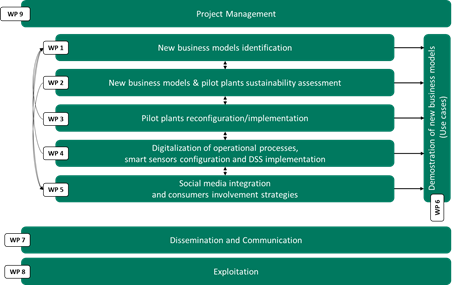- WP1 – New Business Models Identification
The main target of this WP is the identification of new business models. Best practices in different domains (e.g. automotive, mass electronics, household appliances) will be investigated to draw conclusions for the recycling of electronic components. Based upon these findings, adoptable business models will be identified and further specified. Emphasis will be on both sustainability and circular economy principles. Considering the strict co-development context of FENIX, a continuous process of information sharing between different WPs will be actuated.
- WP2 – New Business Models & Pilot Plants Sustainability Assessment
The WP has the major aim to assess the identified business models in terms of economy, environment and society. With this assessment should be proven that the FENIX approach leads to the realisation of a circular economy. To draw this conclusion, the characteristics of the circular economy will have to be defined and KPIs have to be found that can be used to measure the success of the FENIX concepts. The assessment tasks will be twofold. In a first step, the economic and environmental aspects of the business models will be analysed based upon the theoretic description. After the models have been implemented in pilot plants (WP 6), a second assessment will take place that will evaluate the actual situation of the plants. In this task, the results of both assessment steps will be compared to each other to support the further development of the underlying methods.
- WP3 – Pilot Plants reconfiguration/implementation
The main goal of this work package is the development of sustainable processes for the joined treatment of different kinds of waste streams, i.e. automotive shredder residue (ASR) and e-wastes (printed circuit boards). The specific objectives are reported below:
- Simulation of the selected assembly-disassembly processes
- Testing at lab-scale of the selected assembly-disassembly processes
- Testing at lab-scale of the selected materials recovery processes
- Reconfiguration, testing and optimization at pilot-scale of the selected materials recovery processes
- Testing at lab-scale of the selected additive manufacturing processes
- Reconfiguration, testing and optimization at pilot-scale of the selected additive manufacturing processes
- WP4 – Digitalization of operational processes, smart sensors configuration and DSS implementation
The purpose of this work package is to formulate the framework of FENIX Decision Support System. The development of such a framework entails many challenges such as the creation of a metamodel that will be used for the conceptualization of the DSS knowledge, the creation of knowledge instances based on deployed sensor infrastructure and the development of the DSS engine per se.
- WP5 – Social Media integration and consumers’ involvement strategies
The aim of this WP is to enhance the participation of customers and end-users in the innovative processes of FENIX using the following involvement strategies:
- Social media integration
- Incentives through tokens and gamification
- Market place platform connected to DSS
- Crowdsourcing and crowdfunding.
- WP6 – Demonstration of New Business Models (Use Cases)
The aim of this WP is to demonstrate in practice the real application of the selected business models of FENIX, in particular :
- Demonstrate at relevant industrial scale the technical feasibility of the circular business models
- Demonstrate the potential in pilot reconfiguration to address new application or fluctuating market requests
- Demonstrate cost production reduction thanks to the combination of the pilots in the circular economy
- WP7 – Dissemination and Communication
This WP focuses in on the dissemination of project results and the development of an ecosystem of partners along the value chain, in order to guarantee a sustainable impact to the project, once it is completed. Specific tasks of this WP are:
- Elaborate a successful dissemination plan
- Develop the project communication infrastructure
- WP8 – Exploitation
WP8 objective is to prepare wide exploitation of the project results by identifying individual and sectorial business opportunities, target markets and exploitation routes for both the platform technology itself as well as the developed solutions/applications/use cases. WP8 sub-objectives are:
- Set up exploitation routes for FENIX project outcomes
- Develop market intelligence activities and target the most relevant markets of operation
- WP9 – Project Management
SAT will be the primary contributor (and leader) of this WP and is responsible for producing the periodic reports and final report. All partners need to actively participate in the activities of this WP, for this reason they have resources allocated in this WP. Specific objectives of this WP are:
- Ensure the proper overall management of the project in order to strengthen and support the participants to achieve the objectives, complete the milestones in time and deliver the deliverables
- Make sure that the consortium’s contractual duties are carried out
- Advise and guide the participants to comply with EU regulations and their contractual and legal requirements
- Abide by the “good practice” of resources management as presented in the Financial Guidelines
- Set-up an effective communication infrastructure and foster the integrative process in the consortium

